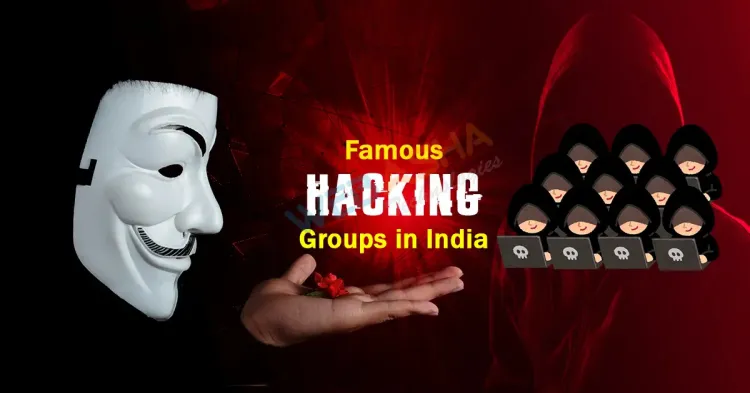Famous Hacking Groups in India
Explore the most notable hacking groups in India and their impact on the cybersecurity landscape. Learn about the activities, motives, and influence of famous hacker groups such as Indian Cyber Army, Anonymous India, and more. Understand their roles in cyber attacks, hacktivism, and digital security.

In the ever-evolving realm of cybersecurity, hacking groups play a significant role, both in terms of threat and intrigue. India, with its burgeoning tech industry and growing digital infrastructure, has seen the rise of several hacking groups that have made headlines for their activities. These groups often operate with various motives, ranging from political activism to financial gain. Understanding these groups provides valuable insights into the cybersecurity landscape in India. This article explores some of the most notable hacking groups in India, their activities, and their impact on the digital world.
What Do Hacker Groups Do?
Hacker groups engage in a range of activities depending on their motives, resources, and objectives. These activities can be categorized into several key areas:
1. Cyber Attacks
Distributed Denial of Service (DDoS) Attacks: Overloading a target’s servers or network with excessive traffic to disrupt their operations. This can lead to outages or degraded performance of websites and online services.
Malware Deployment: Creating and distributing malicious software (malware) such as viruses, worms, ransomware, and spyware. Malware can infect systems, steal data, or cause operational disruptions.
2. Data Breaches
Unauthorized Access: Gaining access to systems or networks without permission to steal sensitive information such as personal data, financial records, or proprietary business information.
Data Exfiltration: Extracting large volumes of data from a compromised system and either selling it on the dark web or using it for malicious purposes.
3. Website Defacement
Changing Web Content: Altering the content of a website to display unauthorized messages, images, or propaganda. This is often done to embarrass organizations or make political statements.
Protest and Activism: Using website defacement as a form of protest to draw attention to social or political issues.
4. Hacktivism
Political and Social Activism: Using hacking techniques to promote political agendas, advocate for social justice, or protest against governments, corporations, or other entities.
Campaigns and Protests: Launching cyber-attacks or performing digital acts of civil disobedience to support causes or bring attention to specific issues.
5. Financial Gain
Ransomware: Encrypting a victim’s data and demanding a ransom payment for its release. This form of attack is primarily financially motivated.
Fraud and Theft: Engaging in activities like phishing, identity theft, and credit card fraud to steal money or financial information from individuals and organizations.
6. Espionage
Corporate Espionage: Infiltrating corporate networks to steal trade secrets, competitive intelligence, or proprietary information for business advantage.
Government Espionage: State-sponsored hacker groups may engage in espionage to gather intelligence on other countries’ governments, military operations, or critical infrastructure.
7. Vulnerability Research
Identifying Security Flaws: Finding and exploiting security vulnerabilities in software and systems. This can be for ethical reasons, like reporting vulnerabilities to improve security, or for malicious purposes.
Responsible Disclosure: Ethical hacker groups may disclose vulnerabilities to organizations or vendors so they can address the issues before they are exploited.
8. Training and Recruitment
Skill Development: Training new members in various hacking techniques, tools, and strategies.
Recruitment: Recruiting skilled individuals through online communities, forums, or personal networks to join their hacking activities.
9. Intellectual Property Theft
Piracy: Stealing and distributing copyrighted material, such as software, games, or proprietary content, without authorization.
Research and Patent Theft: Stealing research data or patented technologies to gain a competitive edge or for financial gain.
10. Social Engineering
Manipulating Individuals: Using deception to trick individuals into revealing confidential information or performing actions that compromise security.
Phishing and Spear Phishing: Deceiving individuals into providing personal or financial information by pretending to be a legitimate entity or individual.
Famous Hacking Groups in India
1.Indian Cyber Army (ICA)
Overview: The Indian Cyber Army is one of the most well-known hacking groups in India, often associated with patriotic and political motives. The group has been involved in defacing websites and launching cyber-attacks against entities they perceive as threats to Indian interests.
Activities: ICA has targeted websites of foreign governments, organizations, and individuals, often aiming to make political statements or respond to perceived insults against India.
2.Legion of Doom
Overview: Legion of Doom is a group of ethical hackers and cybersecurity experts based in India. Unlike many other hacking groups, this group focuses on finding and reporting vulnerabilities rather than exploiting them.
Activities: They contribute to the cybersecurity community by discovering security flaws, participating in bug bounty programs, and assisting organizations in improving their security posture.
3.Anonymous India
Overview: Part of the larger Anonymous collective, Anonymous India is a hacktivist group known for its online protests and campaigns. They operate under the banner of the international Anonymous movement, which is famous for its decentralized and leaderless structure.
Activities: Anonymous India has been involved in various cyber-attacks and campaigns related to social justice issues, government corruption, and freedom of information. Their actions often include website defacements and data leaks.
4.H4ck3rs
Overview: H4ck3rs is a group of Indian hackers known for their involvement in various high-profile cyber incidents. The group has gained notoriety for its sophisticated hacking techniques and involvement in global hacking forums.
Activities: H4ck3rs have been known to engage in data breaches, cyber espionage, and other activities aimed at compromising sensitive information and systems.
5.Indian Cyber Warriors
Overview: The Indian Cyber Warriors is another prominent hacking group that focuses on ethical hacking and cybersecurity. They are involved in security research and contribute to the protection of Indian digital infrastructure.
Activities: Their work includes vulnerability assessments, penetration testing, and providing security training to organizations and individuals.
6.Red Eagle
Overview: Red Eagle is a hacking group based in India known for its activism and cyber-attacks aimed at various political and social targets. They are known for their distinctive hacking style and targeted campaigns.
Activities: Red Eagle has been involved in defacing websites, leaking sensitive information, and launching attacks against entities they consider corrupt or unethical.
7.Indian Hackers Group (IHG)
Overview: The Indian Hackers Group is a collective of hackers known for their diverse skills and involvement in various cyber activities. They are often recognized for their ability to execute complex hacking operations.
Activities: IHG has been engaged in activities ranging from data theft to defacing websites and participating in hacking challenges.
Conclusion
The hacking groups in India represent a broad spectrum of motives and methods, from patriotic activism and ethical hacking to more malicious activities. Understanding these groups helps shed light on the challenges faced by cybersecurity professionals and the evolving nature of cyber threats in the region. As technology continues to advance, so too will the tactics and strategies of these groups. Staying informed about their activities and impact is crucial for enhancing cybersecurity measures and protecting digital assets. Whether for professional curiosity or academic interest, exploring the dynamics of these hacking groups provides valuable insights into the cybersecurity landscape in India.
FAQs
1. What are hacking groups?
Hacking groups are organized collectives of individuals who collaborate to exploit computer systems, networks, and software vulnerabilities. They often have specific goals, such as political activism, financial gain, or data theft.
2. Which are the most notable hacking groups in India?
Some of the most notable hacking groups in India include:
- Indian Cyber Army (ICA): Known for its patriotic motives, ICA has been involved in various hacking activities to promote national interests.
- Anonymous India: A part of the global Anonymous collective, this group focuses on social justice and has targeted various government and corporate entities.
- Legion of Doom: An Indian hacking group known for its sophisticated techniques and involvement in cybercrime.
- Indian Hackers Community: This group engages in ethical hacking and cybersecurity research, aiming to improve security measures.
3. What are the common motives behind hacking activities in these groups?
Motives can vary, including:
- Political Activism: To express dissent or support political causes.
- Financial Gain: To steal money or valuable data.
- Cyber Espionage: To gather intelligence for personal or national interests.
- Social Justice: To expose corruption or highlight social issues.
- Hacktivism: To challenge systems perceived as unjust or corrupt.
4. How do these groups operate?
Hacking groups typically use a variety of techniques, such as:
- Phishing Attacks: To trick individuals into revealing sensitive information.
- Malware: To infect and control systems remotely.
- DDoS Attacks: To overwhelm and disrupt websites and services.
- Exploiting Vulnerabilities: To gain unauthorized access to systems.
5. Are these hacking groups legal?
Most hacking groups operate illegally, particularly those involved in malicious activities, data theft, or attacks on systems without authorization. However, some groups, especially those focusing on ethical hacking and cybersecurity, work within legal frameworks to improve system security.
6. How can one protect against attacks from these groups?
To protect against hacking attacks, consider:
- Using Strong Passwords: Employ complex and unique passwords for different accounts.
- Regular Software Updates: Keep software and systems updated to patch security vulnerabilities.
- Implementing Firewalls and Antivirus Software: To protect against malware and unauthorized access.
- Educating Users: Train individuals to recognize phishing attempts and other social engineering tactics.
7. How does law enforcement handle hacking activities in India?
Indian law enforcement agencies, such as the Cyber Crime Cells of various state police forces and the National Investigation Agency (NIA), investigate hacking incidents. They use digital forensics and collaborate with international agencies to track and apprehend cybercriminals.
8. What are the legal consequences of hacking in India?
Under the Information Technology Act, 2000, hacking is a criminal offense in India. Penalties can include fines and imprisonment, depending on the severity of the crime and the damage caused.
9. Are there any initiatives to combat hacking in India?
Yes, several initiatives aim to combat hacking and cybercrime, including:
- Cybersecurity Awareness Programs: To educate the public and businesses about online security.
- Government Agencies: Like the National Cyber Coordination Centre (NCCC) and the Indian Computer Emergency Response Team (CERT-In), which work to enhance cybersecurity and respond to incidents.
- Private Sector Collaborations: Companies and organizations often work with cybersecurity firms to protect their systems and data.
10. How can one get involved in ethical hacking in India?
To get involved in ethical hacking:
- Obtain Relevant Certifications: Such as Certified Ethical Hacker (CEH) or Offensive Security Certified Professional (OSCP).
- Participate in Cybersecurity Communities: Join forums, attend conferences, and engage with other professionals in the field.
- Work with Organizations: Look for opportunities with companies or institutions that focus on cybersecurity and ethical hacking.












![Top 10 Ethical Hackers in the World [2025]](https://www.webasha.com/blog/uploads/images/202408/image_100x75_66c2f983c207b.webp)



![[2025] Top 100+ VAPT Interview Questions and Answers](https://www.webasha.com/blog/uploads/images/image_100x75_6512b1e4b64f7.jpg)







